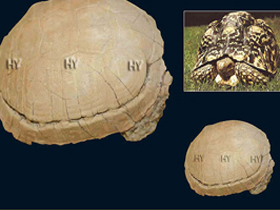 One of the most important branches of science to shed light on the origin of life is paleontology, the study of fossils. The fossil beds studied with enormous dedication over the last 100 years reveal a picture in stark contrast to Darwin's theory. Species did not emerge by evolving, but appeared suddenly on Earth, with all their various structures fully formed. |
Paleontology is a branch of science that investigates fossils of organisms that lived in various geological periods and helps provide information about species living in those eras.166 Another definition of paleontology is the branch of science that studies the fossils and biology of extinct organisms. The first paleontological research began in the 19th century, studying plant and animal fossils to determine the life forms that existed in the geological past, as well as their morphology, structure, taxonomic relations with present-day species, geographical distribution and environmental relationships. Information obtained from paleontology is used to determine the age of geological strata.
The theory of evolution most commonly manifests itself in paleontological research, because fossil findings have been highly prone to evolutionists' distortions and biased interpretations. History is full of forgeries perpetrated in the search for supposed evidence for the theory of evolution. (See The Piltdown Man Fraud, The Nebraska Man Fraud, and The Neanderthal Man Fraud.)
A large number of well-trained scientists outside of evolutionary biology and paleontology have unfortunately gotten the idea that the fossil record is far more Darwinian than it is. This probably comes from the oversimplification inevitable in secondary sources: low-level textbooks, semipopular articles, and so on. Also, there is probably some wishful thinking involved. In the years after Darwin, his advocates hoped to find predictable progressions. In general these have not been found yet the optimism has died hard, and some pure fantasy has crept into textbooks. 167
That individual kinds of fossils remain recognizably the same throughout the length of their occurrence in the fossil record had been known to paleontologists long before Darwin published his Origin. Darwin himself, . . . prophesied that future generations of paleontologists would fill in these gaps by diligent search . . . One hundred and twenty years of paleontological research later, it has become abundantly clear that the fossil record will not confirm this part of Darwin's predictions. Nor is the problem a miserably poor record. The fossil record simply shows that this prediction is wrong. 168
The observation that species remain amazingly stable, and for very long periods of time, contains all the features of the story of "The Emperor's New Clothes." Everyone saw the truth, but all chose to ignore it. Paleontologists were faced by a fossil record that definitively refutes the picture that Darwin imagined, but openly turned their backs on the truth.
The American paleontologist S.M. Stanley describes how this fact, revealed by the fossil record, is completely ignored by the Darwinist dogma that dominates the world of science:
The known fossil record is not, and never has been, in accord with gradualism. What is remarkable is that, through a variety of historical circumstances, even the history of opposition has been obscured… "The majority of paleontologists felt their evidence simply contradicted Darwin's stress on minute, slow, and cumulative changes leading to species transformation." . . . [but] their story has been suppressed. 169
166. Prof. Dr. Eşref Deniz, Tıbbi Biyoloji, 4th Edition, Ankara, 1992, p. 354.
167. Science, July 17, 1981, p. 289.
168. N. Eldredge, and I. Tattersall, The Myths of Human Evolution, Columbia University Press, 1982, pp. 45-46.
169. S. M. Stanley, The New Evolutionary Timetable: Fossils, Genes, and the Origin of Species, New York: Basic Books Inc. Publishers, 1981, p. 71.


